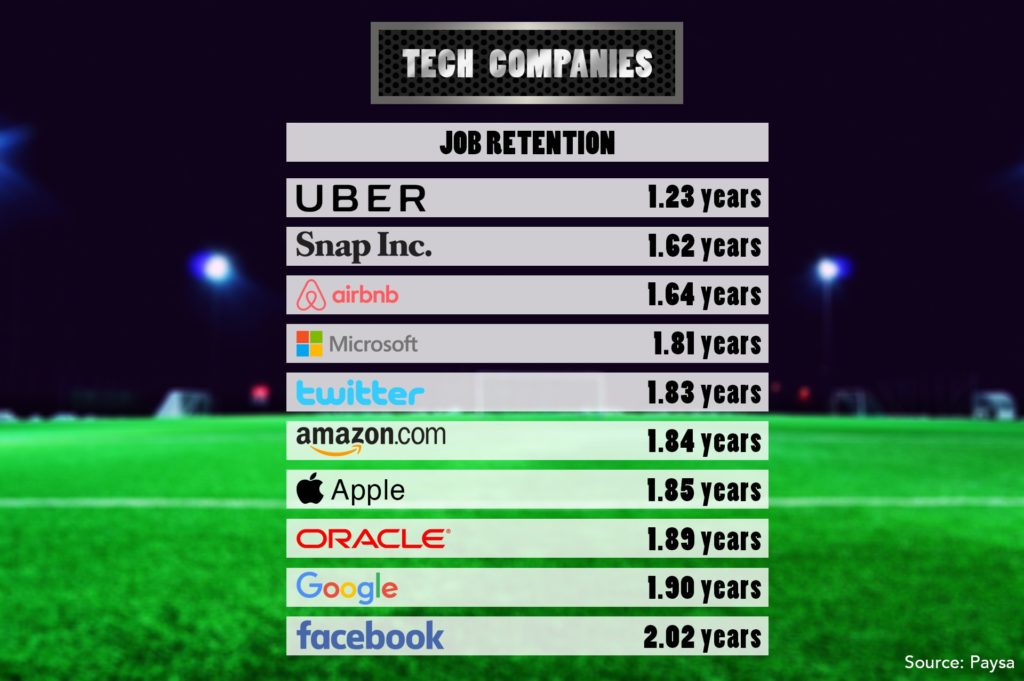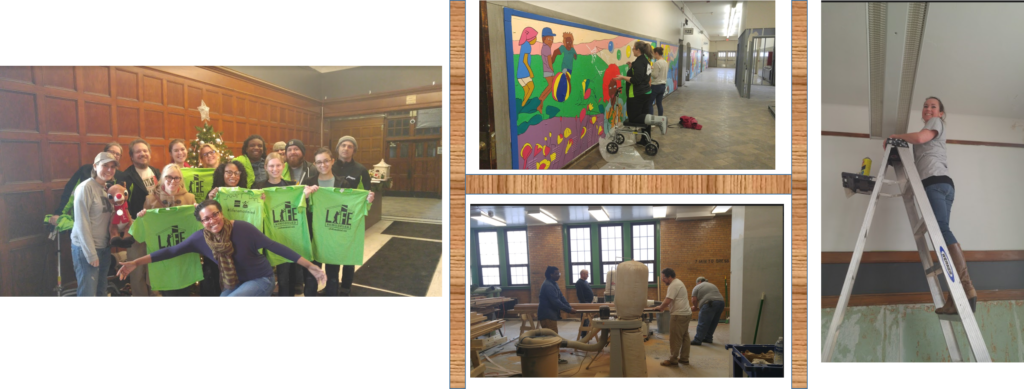
Yesterday’s blog post listing a baker’s dozen ways radio operators can avoid Armageddon in 2018 stimulated a lot of comments both here and on social media. A number of people specifically mentioned the culture issue; specifically, what it takes to create an internal environment that engenders teamwork, creativity, and passion.
If you’re on LinkedIn, you probably receive notifications all the time about celebrating work anniversaries – the length of time someone has been with the same company. Interestingly, a new report from Paysa indicates that for behemoth tech giants that include Apple, Facebook, and Google, these reminders are few and far between. In fact, they are rarities at many of the companies that supposedly everyone aspires to work for.
In fact, the average amount of time an employee lasts at the ten companies you see on the above chart is well under two years (21 months, to be exact).
So, what does that tell you about all the amazing perks you read about that tech icons offer – benefits like pinball machines, gourmet chefs, free massage Fridays, improv classes, and on-site acupuncture?
My favorite? Facebook offers “Baby Cash” – up to $4,000 for employees with an infant. And yet, Facebook barely retains their workers for two years (but that puts them ahead of just about everyone else). I don’t know how long the average employee in radio lasts, but I’d venture to say it’s quite a bit longer than two years.
Now, some of you may be thinking this must be a “Millennial thing” – that the explanation for all this job churn is due to the transient, nomadic nature of young people. And that probably accounts for some of this career hopping.
But looking at companies from Uber to Twitter to Apple, a retention rate of less than two years isn’t the least bit impressive. Ultimately, it’s expensive, in terms of training, orientation, and in some cases, severance.
I remember that about 5 years into PPM, Arbitron started providing information on the habits and characteristics of successful stations with their emerging ratings methodology. Variables like the number and length of listening “occasions” and daily cume were always big determinants in separating highly rated stations from also-rans.
But it has also been our experience here at Jacobs Media that many of the most consistently successful stations – in terms of ratings, sales, and brand building – can’t be explained by metrics, analytics, or algorithms. Oftentimes, the very best operations display a great deal of staff stability.
Now we all know the downsides of hanging onto decreasingly productive people. Anyone who has ever served in management will tell you about someone who should have been terminated months (or even years) before the event inevitably happened.
But assuming you know how to identify solid people, there’s almost always more benefit in having station veterans – people who know the market, the operation, and the company – mixed together with an infusion of young talent. Like great sports teams, it’s always about that chemistry between experience and youth that wins championships.
My supposition is that if you look at the consistent radio winners in your market, you’ll find core staffs that have been in place for years, and in many cases, decades. Staff stability is what begets deep, inside market knowledge, station history, intense pride, strong passion, and winning track records.
My guess – or my hope – is that if you took inventory of your current staff, you’re dealing with a crew that averages well more than two years on the job. Go ahead, do the math, and let me know.
Because if I’m right, that stability is a benefit you can offer potential new hires because it suggests your operation and your company value experience and career growth. While many ambitious young people are desirous of moving up the ladder as quickly as possible, a stable operation is often more satisfying to be a part of. And they’re more successful in the long run.
It seems counter-intuitive to think of radio as a stable business. But during a time when tech companies are burning through smart, young people at an alarming rate, radio may have an edge.
Much of this advantage may be due to the larger company culture, or more likely, the vibe in your building. Certainly, broadcast execs will tell you there are often vast differences in the “vibe factor” as they trek from market to market. Unlike other assets – the building, the license, the vans – company culture is an intangible. But you know it when you have it. And you should recognize it when you don’t. It could very likely be part of the reason you’re not as successful as you should be.
In spite of the rampant consolidation, the buying, the selling, and the swapping, and the topsy-turvy nature of the industry this past many years, radio is still very much a relationship business. It’s the connections your station has with the community, your advertisers, and your audience. But it’s also the “community” that forms when staffs work, grow, suffer, and thrive together.
When I walked out the door of WRIF more than three decades ago to form Jacobs Media and get Classic Rock off the ground, I left a very special internal culture. Remarkably, four owners later, that vibe survives and thrives with the same DNA as when I entered the trailers back in the ’70s. The faces have changed, but that culture flourishes.
I see this phenomenon taking shape at jācapps, our mobile apps company. And it’s a vibe that doesn’t start in the corner office or in an HR policy handbook. It’s organic to be sure, but it’s something that management and ownership at the highest levels need to understand and nurture.

Our hardy and growing staff exudes that culture, and it carries over to after-work hours. Most recently, the jācapps team supported and provided meals for disadvantaged families over Thanksgiving. And last month, the group spent the afternoon painting and rebuilding a former inner-city Detroit middle school as part of an initiative called Life Remodeled. A second event is planned in 2018 as the school will be converted into what will be known as a Community Innovation Center serving kids in the neighborhood.
Notably, this was not jācapps’ COO Bob Kernen’s idea or something that came from Paul or me. It’s a sign that culture, spirit, and innovation start at the bottom and work their way through the guts of the organization. Staff stability may not be the top goal at jācapps, but it’s no accident the core management and development team have already been in place for a long time.
Stability can get your organization through the tough times, and it will make the victories that much sweeter. It’s no accident that of the 10 companies listed on this chart, the one with the least stability – Uber – is also the one in the most trouble. Analysts will tell you they’re rudderless, they have systemic problems, and despite their leadership position in a category they created, they’re in danger of it crashing. I’m not suggesting that a poor job retention score is the core reason for their ills, but perhaps it’s the conditions in their “building” that has systemically nurtured an atmosphere that is negative or even toxic. When their average worker lasts just 15 months, there’s something wrong.
That doesn’t mean that broadcasters shouldn’t be studying today’s tech companies to gain a better understanding of what young people value in their jobs. And many of the perks offered by companies like Apple or Amazon are worth studying and perhaps offering.
But it takes more than a ping-pong table and “Baby Cash” to create a culture.
You can make a contribution to Life Remodeled here.
- What To Do If Your Radio Station Goes Through A Midlife Crisis - April 25, 2025
- A 2020 Lesson?It Could All Be Gone In A Flash - April 24, 2025
- How AI Can Give Radio Personalities More…PERSONALITY - April 23, 2025




I just passed my 30th year with our radio company here in Alaska. I now have 8 radio stations to juggle as the Operations Manager, PD on 2 stations, MD on two others, play by play sports on our ESPN affiliate and the Morning show host on our rock station besides my daily Ops duties. The average job stay at our company is well over 15 years-I have a group of people who love what they do and you nailed it right on the head with “vibe factor”-and nobody knows this market like we do and it shows.
I expected comments like this. Thanks for the kind words, the great story, and I hope you get as little time off for the holidays! 🙂
I think some of the disparity stems from the kind of work available and comp. Jacapps is the exception – there isn’t a lot of leading tech work available in the radio world and sales jobs at tech companies pay a lot better – so it isn’t apples and apples. And in the tech world they expect you to job hop, in the radio world, non competes can make it nearly impossible. The cultures are very different.
That said, there aren’t jobs at Google like being a morning show host. In fact, you could make a good morning show bit out of the questions Google asks and expects correct answers to before they’ll hire you to throw out the scraps from those farm to table meals they give as a perk.
Different cultures and different expectations.
We have one colleague approaching 50 years, another two that are 35+ years here, and I (an “old millennial”) still feel relatively “new” at 11 years!
David Polk
Program Director, WFMT
David, it sounds like that’s one of the reasons why it works. Thanks for taking the time to comment.
We all know what it will take to grow. Repopulate the stations with talented people who make a good wage for long work hours. Today we all need more time to do everything that goes into pulling off a successful radio environment. But, after 10 hour days the last thing most people want is to spend feel good time with coworkers. Most of the time its forced and you don’t even feel satisfaction from the effort. Unity has its worthy advantages, but away time is healthier. Perhaps that is what those other groups see in retention numbers, and why radio has lost so much of its previous work force.
I appreciate these comments, and I feel guilty sometimes when I publish lists of what radio personnel can do to improve their positions and their brands. I totally get there are so many hours in a day, and there are life and family decisions to be made. I agree that with more forced duties and deadlines, it’s hard to take pride in the work. Thanks for weighing in with a comment from the trenches.